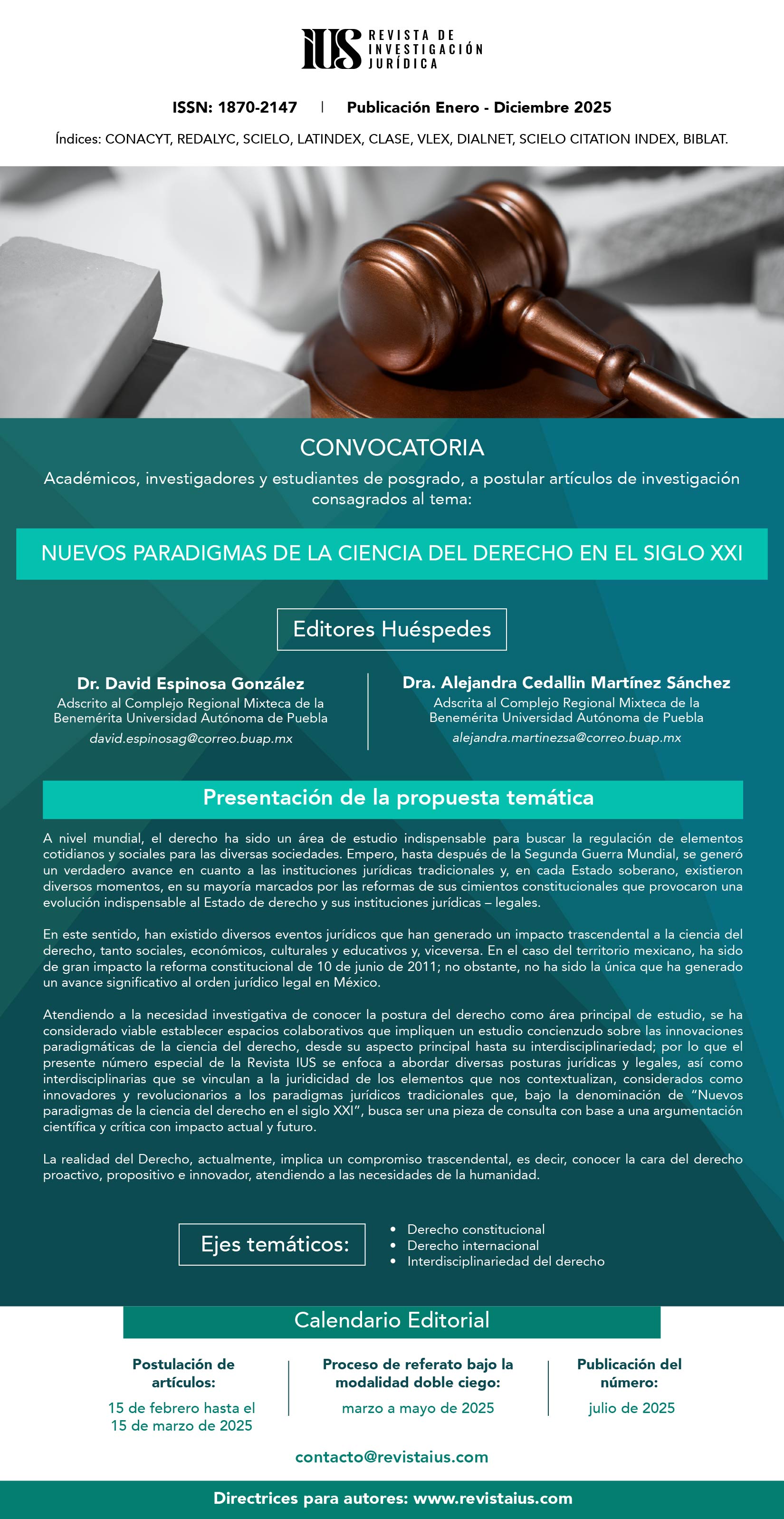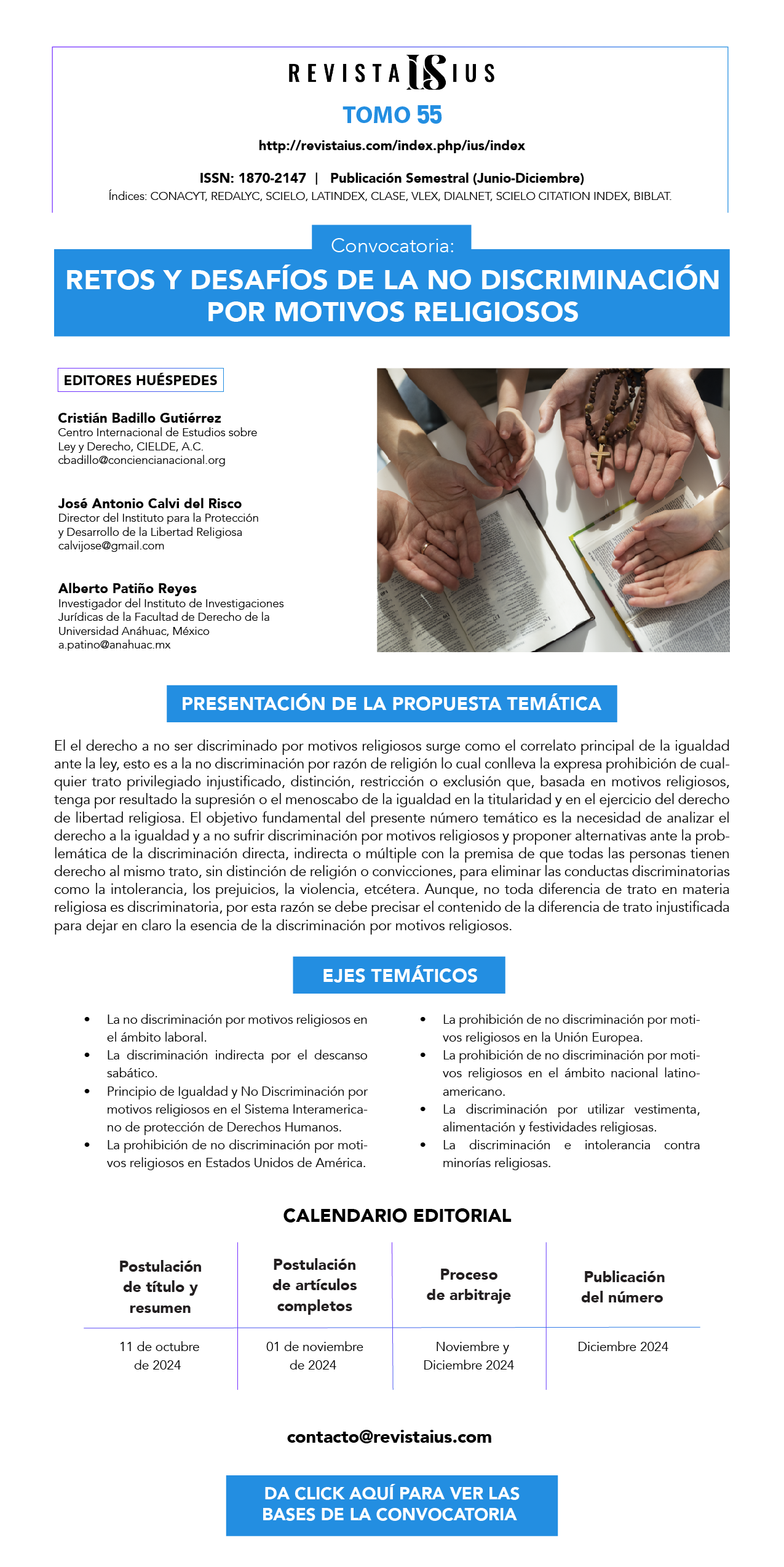Peer review policy
On 14 September 2016, the Editorial Committee of the Legal Sciences Institute of Puebla A.C. announced the following with regard to all contributions proposed for review: they must be original; they must be subject to the journal’s thematic lines and the formats set out in the Section Policies; they must present results obtained using ethical research practices; they must be unpublished and may, thus, not be simultaneously proposed to another journal, or be published in another review (in any language); and, must not be disseminated via another platform or media.
The proposal, review and editorial management process will be undertaken via the Open Journal Systems platform (https://revistaius.com/index.php/ius), with the author signing as corresponding author solely responsible for the management of the contribution.
All authors will receive email notification from the Open Journal Systems platform as to the status of the editorial process for the documents proposed for review.
To begin the proposal process, the authors are required to ensure that the proposed document is produced under the format set out in the Directives for Authors and the requirements established in the Checklist for the Preparation of Submissions.
they must be unpublished and may, thus, not be simultaneously proposed to another journal, or be published in another review (in any language); and, must not be disseminated via another platform or media.
The proposal, review and editorial management process will be undertaken via the Open Journal Systems platform (https://revistaius.com/index.php/ius), with the author signing as corresponding author solely responsible for the management of the contribution.
All authors will receive email notification from the Open Journal Systems platform as to the status of the editorial process for the documents proposed for review.
To begin the proposal process, the authors are required to ensure that the proposed document is produced under the format set out in the Directives for Authors and the requirements established in the Checklist for the Preparation of Submissions.
Subsequently, the editorial team and the Executive Editor will have 30 calendar days in which to complete the editorial review and, thus, approve or reject the contribution.
This process comprises four stages:
I. Review of the thematic relevance of the contribution to Revista IUS (México).
In the event that the document is suitable for neither the thematic profile of the call for papers nor the Section Policies, it will be immediately rejected.
II. The contribution must be subject to an exhaustive review by means of an antiplagiarism tool, which will guarantee the originality and unpublished status of the document.
In the event that the tool identifies a 25 % level of coincidence with any other previously published document or one disseminated on any platform, it will be automatically rejected.
III. The document will be subject to an exhaustive review under the format established in the Directives for Authors and the Checklist for the Preparation of Submissions.
In the event that not all the established criteria are fulfilled, the contribution will be automatically rejected.
IV. Priority will be given to the subsequent review phases for those documents complying with the following characteristics: 1) Content linked to the subsequent thematic issues, as established in the Revista IUS (México) issue timetable; and, 2) The bibliography must be up-to-date and in compliance with Official Standard ISO 690 and, preferably, compiled using a digital reference manager.
If the contribution passes the four phases corresponding to the editorial review, the Executive Editor will notify the corresponding author that their contribution has been accepted and will now be subject to the Peer Review process.
Peer Review
To guarantee the scientific quality of the content published in Revista IUS (México), the editorial team will subject all proposed contributions to the double-blind peer review system.
Subsequent to the contribution successfully passing the editorial review, the peer review will be conducted under the following process on the website of the Open Journal Systems platform:
1) The Executive Editor will send the contribution to two anonymous peer reviewers.
Peer reviewers must be a researcher or professional external to the journal’s editorial institution and an expert on the topic covered in the text to be reviewed.
2. The designated peer reviewer will have 30 calendar days to produce their decision/recommendation and submit to the Executive Editor the Peer Reviewer Form, which must contain a critical and exhaustive evaluation based on the following criteria.
- thematic relevance and originality in the context of the academic discipline
- methodological rigour
- mastery of the topic and a coherent theoretical framework
- scientific contribution and argumentative solidity to the thesis it presents
- that the sources used are rigorous and up-to-date
- writing, orthography and expository quality
- correspondence of the conclusions and contributions with the established objectives
3) The results of the decision/recommendation may be:
a) Accepted without corrections;
b) Accepted with corrections (wherein modifications are proposed relating to grammatical issues, the presentation of information, methodological justification, and the clarification of the data obtained, among others); or,
c) Rejected;
4) In order for the contribution to be accepted for publication, is must have received two positive decisions/recommendations (accepted and/or accepted with corrections), while a third decision/recommendation is obtained when the contribution is rejected by one of the peer reviewers and accepted by the other, for which reason the Executive Editor will send the document to a third peer reviewer for review.
5) The decisions/recommendations will be unappealable.
6) After they have received the decisions/recommendations from the peer reviewers, the Executive Editor will be responsible for ensuring that the reviews were undertaken responsibly and ethically and that the rubrics established in the section were analysed/applied during the process 2. This review must not last longer than 10 calendar days.
7. If the Executive Editor finds that the decisions/recommendations were undertaken in accordance with Criterion 6, they will have five calendar days to notify the corresponding author of the decision/recommendation:
a) Accepted:
The articles accepted under these criteria then begin the publication process (proofreading, design, layout, metadata tagging) om order to generate a preliminary version of the article.
Similarly, the author will be notified of the result of the decision/recommendation and will then be required to submit the Waiver of rights for the publication and dissemination of articles in Revista IUS (México) within five days, with the waiver required to be signed by each of the authors.
b) Accepted with corrections:
The Executive Editor will notify the corresponding author of the result of the decision/recommendation, with the latter given 20 calendar days in order to submit the new version with the requested corrections made, along with the Changes derived from the decision/recommendation form, which will contain a list of the changes made as a result of the peer review process.
The Executive Editor, together with the editorial team, will check that the changes requested were implemented and, in the event that the review is accepted, the document will begin the same publishing process to that undergone by accepted articles.
In the event that the author does not submit the corrections in the established time period, the article will have to be proposed for publication again.
c) Rejected: The Executive Editor will notify the corresponding author of the decision/recommendation.
Subsequent to both the completion of the design process for the publication of the article and the reception of the waivers of economic rights, the issue will be sent to the issue coordinator, who will review the status of the editing process in order to ensure the quality of the editing in accordance with the proofreading form submitted by the Executive Editor.




